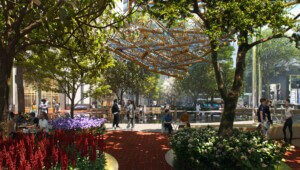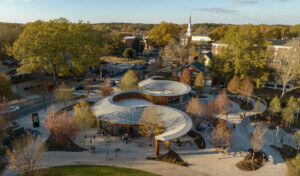After this spring’s conferences on high-minded architecture, from NYCxDESIGN to the AIA Convention to the Venice Bienniale, how about some design with a lower case ‘d’?
That’s what’s on the agenda for more than 200 registrants of the Vernacular Architecture Forum (VAF), a conference now underway in Durham, North Carolina. The four day meeting is entitled “From Farm to Factory: Piedmont Stories in Black and White.” Participants will gather at the Durham Marriott to hear talks about topics such as “Documenting Historic Graffiti,” “The Transformation of Working Class Housing and Domesticity,” and “The Community Center and the Barber Shop.”
They’ll fan out into the surrounding area to tour tobacco farms, textile mills, churches, barns, slave quarters and a Quaker village or two. Many of the tour sites are related to slavery or tobacco or both. In addition to a Thursday evening pig-pickin’, the menu will include North Carolina barbecue, country ham biscuits, chicken pastry, collards, hushpuppies, banana pudding and sweet tea. In many ways it’s the opposite of meetings such as the AIA convention, which aim to celebrate the “best” of American design, with honors such as the 25 Year Award for buildings that have stood the test of time and the AIA Gold Medal.
The Vernacular Architecture Forum, by definition, seeks to focus on the ordinary parts of the American landscape, including many buildings and places that weren’t designed by licensed architects or landscape architects at all. “The Vernacular Architecture Forum is the premier organization in North America dedicated to the appreciation and study of ordinary buildings and landscapes,” the group says on its website. “Established in 1979, VAF is composed of scholars from many fields, including history, architectural history, geography, anthropology, sociology, landscape history, historic preservation, and material culture studies.”
During the past few decades, “interest in ordinary architecture has grown rapidly and in diverse directions,” the group states. “Scholars and field professionals apply the term ‘vernacular architecture’ to a range of structures including traditional domestic and agricultural buildings, industrial and commercial structures, twentieth-century suburban houses, settlement patterns and cultural landscapes. The Vernacular Architecture Forum was formed…to encourage the study and preservation of these informative and valuable material resources.”
Each year the organization chooses one city or region to explore during its annual meeting, which draws designers, historians, archaeologists, folklorists, geographers, museum curators, preservationists, educators and students from all over the country. This year there’s a twist that makes the event a little less ordinary, and it involves the setting.
The Vernacular Architecture Forum is one of first national groups to hold a meeting in Durham since North Carolina legislators passed House Bill 2, dubbed the “bathroom bill.” The statewide legislation has drawn widespread criticism because it took away certain rights and protections that had been extended to the LGBT community in North Carolina, including allowing transgender people to use the public bathroom of the sex with which they identify.
Performers such as Bruce Springsteen, Ringo Starr, Pearl Jam, and Cirque du Soleil have cancelled shows in North Carolina as a result of the new law, and companies such as Pay Pal and Deutsche Bank have cancelled plans to expand in the state. Mayors of other cities, including New York City and Baltimore, have blocked funding for non essential government employee travel to North Carolina in response to the law. The Vernacular Architecture Forum is one of two design-related conferences that had been scheduled to take place in North Carolina before the legislation was passed and whose leaders decided to proceed with their meetings in the state. The other meeting was the High Point Market of furniture and home goods, which was held in April.
According to organizers of the VAF meeting, the legislation was adopted so soon before the conference that there was no time to switch to another location, as some groups have done. For example, the Community Transportation Association of America backed out of a meeting that would have drawn 1,000 people to Raleigh, but its meeting wasn’t scheduled to take place until 2018. According to David Bergstone, director of architecture for Old Salem Museums and Gardens in Winston-Salem and a member of the planning committee for the Durham event, the VAF selects the location for its annual meetings two to three years in advance and uses the time to plan tours and programs related to that part of the country, so it can offer a site-specific event that takes full advantage of the resources available nearby.
In North Carolina, he said, the group has lined up tours of plantation housing for blacks and whites; farms of the late 19th and early 20th centuries; turn-of-the-20th-century textile and tobacco factories; churches built by Germans, Scotch-Irish, and African Americans; and the former workplace of a gifted African-American furniture craftsman who lived near the North Carolina-Virginia border. “There was no way to move something like this that has been planned over the past two to three years,” Bergstone said. “It wasn’t possible at the last minute.”
Bergstone said the group had several last minute cancellations, but they were due to illness or other personal reasons. He said he wasn’t aware of any cancellations by people protesting House Bill 2, but he acknowledged that there could have been some people who decided not to register because of House Bill 2 and just didn’t tell the VAF. Marvin Brown, a senior architectural historian with AECOM and one of the two co-organizers of the Durham meeting, also said he wasn’t aware of any cancellations related to the bill. “I can’t think of anyone who specifically said they couldn’t come because of it,” he said.
In all, Bergstone said, 220 to 230 people are registered to attend all or part of the four-day meeting. The gatherings typically draw between 100 and 300 people, so the registration figure is in line with past years, he said. “I think we’ve hit our target.” A city government employee in New York said he considered going but decided not to register after he learned that his employer wouldn’t help pay for his trip because of House Bill 2. The New York City employee said several of his colleagues did go to Durham and ended up paying their own way, while another colleague decided not to go because of House Bill 2.
Bergstone and Brown said the situation is unfortunate for Durham because its elected representatives don’t support the legislation, yet they have to live with the consequences. Before the meeting, VAF President Gretchen Buggeln, wrote members to notify them that the VAF was going ahead with the event in Durham and providing information on how they could object to the legislation if they cared to do so. “As many VAF members know, on March 23, 2016, North Carolina’s General Assembly passed into law legislation known as House Bill 2 (HB2),” Buggeln wrote to members. “The leadership and members of the Vernacular Architecture Forum are troubled by this discriminatory bill. This law overrides local LGBTQ nondiscrimination ordinances and bans transgender people from using certain restrooms.
“HB2 is highly controversial within the state of North Carolina and many citizens are fighting the law. The ACLU of North Carolina has filed a federal lawsuit and the state attorney general is a vocal opponent. Moreover, the city council of Durham, the site of our June 2016 conference, unanimously condemned the legislation…[Durham City Councilman Steve] Schewel recommends that those wanting to support the opposition to HB2, and the fight for its repeal, can contribute to Equality North Carolina,” Buggeln continued in her message. “They do great organizing work statewide.
“[Event organizers] Claudia Brown, Marvin Brown, and their team have worked long and hard to prepare a marvelous conference for us. I urge you all to come to Durham and to spread the VAF’s message of concern and care for communities—their buildings, landscapes, but most especially their people—and our vision of equality, dignity, and justice for all.” North Carolina officials have disclosed that the state has lost conventions, conferences and concerts with an estimated economic impact of more than $10 million, since the bill was signed. Most of the bookings have been in larger cities such as Raleigh. Many of the cancelled meetings weren’t scheduled to take place until 2017 or later, so groups had time to find another location.
Last week, the Associated Press reported that attendance was down slightly for North Carolina’s High Point Market, a meeting that was seen as an early test of business reaction to the law. “According to numbers released Friday [May 27] by the High Point Market, this year’s registered attendees—including buyers, exhibitors, media and students—totaled slightly more than 79,000,” the AP reported. “That represents a decrease of 1,000 from the previous year, and a reversal for the market. Attendance at last year’s spring event rose 2.5 percent from 2014.”
Held twice a year, the High Point Market brings an estimated $5 billion a year in economic activity to North Carolina. According to the AP, the High Point event in April represented the largest business-related gathering in North Carolina since House Bill 2 was adopted.










